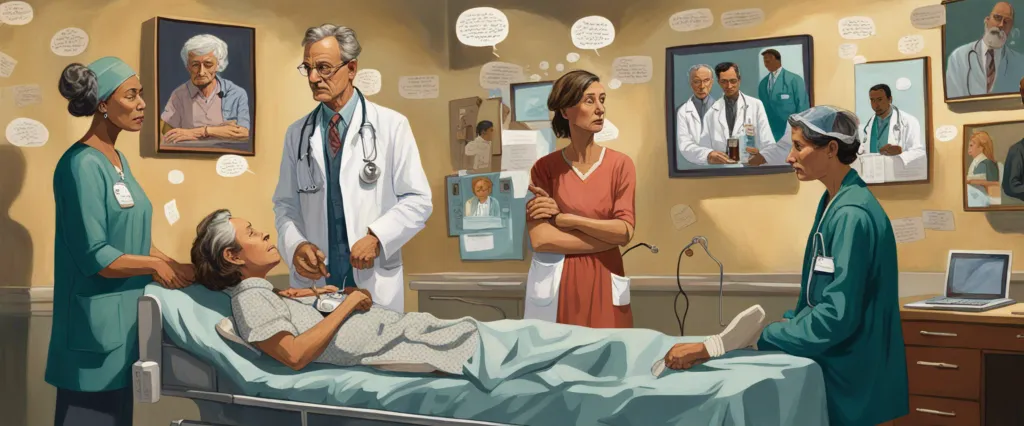——Complications by Atul Gawande & Bad Pharma by Ben Goldacre

In the realm of medical literature, various authors have shed light on the complexities and intricacies of the healthcare field. Atul Gawande’s book “Complications” and Ben Goldacre’s “Bad Pharma” are two remarkable accounts that delve into the inner workings of medicine, exposing both its triumphs and shortcomings. These thought-provoking pieces of literature present insightful narratives that challenge conventional beliefs while advocating for a higher standard of care.
Complications” by Atul Gawande is an eye-opening exploration of the unpredictable nature of medical practice. Drawing on his own experiences as a surgeon, Gawande takes readers on a captivating journey through the complexity of healthcare. By intertwining personal anecdotes with rigorous analysis, he dismantles the notion of medicine as an infallible science, reminding us of the inherent fallibility of healthcare professionals and the sensitivity of human lives.
On the other hand, “Bad Pharma” by Ben Goldacre focuses on the opaque world of the pharmaceutical industry. Goldacre exposes the unscrupulous practices and hidden biases that often plague the pharmaceutical industry. Armed with extensive research and data, he unveils the widespread manipulation of clinical trials, selective publication of favorable results, and the distortion of medical evidence to serve profit-driven interests. Through his book, Goldacre urges for transparency and ethical practices within the pharmaceutical sphere, advocating for a system focused solely on patient well-being.
While Gawande’s “Complications” examines the intricacies of individual patient care, Goldacre’s “Bad Pharma” scrutinizes the systemic flaws within medicine’s larger machinery. Despite their contrasting focuses, both books share a common thread—unmasking the flaws that compromise the sanctity of medical practice. Whether it is the imperfect decision-making process of a surgeon or the unethical practices within the pharmaceutical industry, both authors shed light on the need for continuous improvement and critical evaluation in the field of medicine.
This comparative study aims to provide a comprehensive analysis of the two texts, exploring the distinct perspectives presented by Gawande and Goldacre. By critically examining their narratives, themes, and arguments, we can gain a deeper understanding of the challenges faced by healthcare professionals and the ethical concerns surrounding medical research and practice.
Through a careful examination of “Complications” and “Bad Pharma,” this study endeavors to highlight the overlaps and discrepancies between the two books, shedding light on the lessons they offer and the implications they hold for contemporary healthcare. By doing so, we strive to contribute to the ongoing discourse on improving healthcare practices and promoting patient-centered medical decision-making.
Brief Summary of Two Books
Complications by Atul Gawande
“Complications” by Atul Gawande is a thought-provoking book that explores the complexities, uncertainties, and human fallibility in the field of medicine. Gawande, a surgeon himself, reflects on his experiences and those of other healthcare professionals, revealing the challenges and emotional turmoil involved in practicing medicine.
The book is divided into three parts: Fallibility, Mystery, and Uncertainty. In Fallibility, Gawande focuses on the inevitable mistakes and complications that occur in healthcare settings, exploring the ethical and emotional dilemmas they present. He delves into his own personal failures, discussing cases that haunt him and the lessons he learned from them.
In the second part, Mystery, Gawande examines the limits of medical knowledge. He emphasizes the importance of understanding the patient as an individual, highlighting the significance of empathy, communication, and collaboration in providing effective care. Gawande also tackles the controversial topic of medical malpractice and discusses the transformative power of learning from mistakes and embracing a culture of improvement.
Finally, in Uncertainty, Gawande explores the unpredictable nature of medicine. He discusses the apprehensions and difficult decisions doctors face, especially when dealing with critically ill patients. Gawande illustrates these dilemmas through the stories of patients facing life-threatening conditions, highlighting the moral and ethical complexities surrounding end-of-life care and the balance between hope and reality.
Throughout “Complications,” Gawande raises important questions about the limits of medical science, the impact of technology on the doctor-patient relationship, and the need for continuous professional development. He emphasizes the importance of acknowledging and learning from medical mistakes, striving for constant improvement, and maintaining a patient-centered approach.
In summary, “Complications” is a captivating exploration of the nuanced world of medicine, offering valuable insights and reflections on the challenges faced by healthcare professionals, and ultimately urging for a balance between technical expertise and compassionate care.
“Bad Pharma” by Ben Goldacre is an insightful exposé that delves into the flaws and corruption within the pharmaceutical industry. With a strong focus on the manipulation of scientific research and the distortion of medical knowledge, the book unveils how drug companies withhold crucial data, manipulate clinical trial results, and influence doctors’ prescriptions. Goldacre highlights the dire consequences of these practices on patient safety and public health. Moreover, he discusses the power dynamics between regulators, pharmaceutical companies, and academic institutions, shedding light on the conflicts of interest that hinder unbiased medical research. Offering solutions to reform the system, Goldacre advocates for transparency, open access to trial data, and increased accountability among drug companies, regulators, and healthcare professionals. Overall, “Bad Pharma” serves as a wake-up call to the urgent need for a more trustworthy and ethical pharmaceutical industry.
Comparison between Two Books

Similarities in Positive Thinking
While Atul Gawande’s “Complications: A Surgeon’s Notes on an Imperfect Science” and Ben Goldacre’s “Bad Pharma: How Drug Companies Mislead Doctors and Harm Patients” focus on different aspects of the medical field, both books touch upon the concept of positive thinking in their respective contexts.
1. Focus on patient outcomes: Both authors emphasize the importance of positive thinking when it comes to patient outcomes. Gawande describes how optimism and a positive mindset can influence a surgeon’s ability to navigate complex medical situations, leading to better results for patients. Similarly, Goldacre discusses the need for an optimistic and transparent approach in clinical trials and pharmaceutical research, as it can ultimately contribute to more accurate and beneficial results for patients.
2. Understanding the limitations: Both books highlight the importance of acknowledging the limitations of positive thinking. They caution against blind optimism or an overly positive outlook that can lead to overlooking potential complications or biases. Gawande emphasizes the need for surgeons to openly discuss potential complications or failures to ensure a more realistic and comprehensive approach to medical care. Goldacre exposes the dangers of cherry-picking positive results in clinical trials, stressing the need for a more balanced and transparent approach that takes into account all available data, both positive and negative.
3. Impact on decision-making: Positive thinking plays a role in decision-making throughout both books. Gawande explores how a surgeon’s mindset can influence the choice of interventions and the subsequent management of complications. He discusses the importance of maintaining a positive outlook while also acknowledging and addressing the challenges that arise. Goldacre similarly highlights the impact of positive thinking on the decisions made by pharmaceutical companies, doctors, and regulators. He emphasizes the need for critical thinking and consideration of all available evidence, rather than being swayed solely by positive outcomes or marketing tactics.
4. Patient empowerment: Both authors recognize the benefits of positive thinking in empowering patients. Gawande stresses the importance of clear communication and empathy in helping patients navigate the potentially challenging and uncertain experiences of medical care. By fostering an environment of trust and optimism, patients can actively participate in their own healthcare decisions. Goldacre, on the other hand, highlights the role of informed patients in demanding transparency and better scientific practices, contributing to a more positive and beneficial healthcare system.
In summary, both “Complications” and “Bad Pharma” discuss positive thinking as a relevant and influential aspect of the medical field. While Gawande focuses on its impact on surgical practice, patient outcomes, and decision-making, Goldacre examines its significance in pharmaceutical research, clinical trials, and patient empowerment.
Divergences in Positive Thinking
Complications by Atul Gawande and Bad Pharma by Ben Goldacre are both thought-provoking books that shed light on different aspects of the medical field. While they tackle different subjects, one common divergence between them is their treatment of the concept of positive thinking.
In Complications, Atul Gawande explores the complex world of surgery and medical complications. He delves into the realities and challenges faced by healthcare professionals, emphasizing the importance of critical thinking and acknowledging the inherent risks in medical practices. Gawande tends to present a more realistic and nuanced perspective on positive thinking. While he acknowledges the benefits of a positive mindset in boosting patient morale and aiding recovery, he is cautious about the potential dangers of blindly embracing positive thinking in healthcare. Gawande highlights the importance of balancing optimism with an unbiased evaluation of the situation, as a mere positive outlook may sometimes overshadow the need for thorough analysis and objective decision-making.
On the other hand, in Bad Pharma, Ben Goldacre focuses on the problems within the pharmaceutical industry, specifically regarding the transparency and reliability of clinical trials. Goldacre discusses the negative impact of undisclosed or manipulated data on the healthcare system. However, when it comes to positive thinking, Goldacre takes a more critical stance. He argues that the excessive promotion of positive thinking within the pharmaceutical industry can be deceptive and misleading. Goldacre exposes how companies may selectively publish positive results, while hiding unfavorable outcomes, to present a more promising image of their products. In this context, he emphasizes the need for transparency and unbiased reporting of clinical trials to protect patients’ well-being.
In summary, while both Complications and Bad Pharma touch upon the concept of positive thinking, they diverge in their treatment of the topic. Atul Gawande in Complications highlights the importance of a balanced approach, recognizing the benefits of positive thinking but cautioning against its potential pitfalls in healthcare decision-making. Conversely, Ben Goldacre in Bad Pharma adopts a more critical stance, pointing out the dangers of excessive positive thinking when it comes to the pharmaceutical industry and the need for transparency in reporting clinical trial outcomes.

Conclusion
Both Complications by Atul Gawande and Bad Pharma by Ben Goldacre are highly regarded books that tackle important topics in their respective fields. It ultimately depends on your personal interests and which subject matter resonates with you more.
Complications by Atul Gawande is a collection of essays that provide deep insights into the complex world of medicine and healthcare. It discusses the challenges and failures that doctors face, as well as the importance of learning from mistakes and continuously improving medical practices. This book is particularly valuable for those interested in healthcare, medical ethics, and the inner workings of the medical industry.
On the other hand, Bad Pharma by Ben Goldacre focuses on the pharmaceutical industry and sheds light on the problems of biased clinical trials, undisclosed data, and the misuse of statistics. Goldacre raises important questions about the transparency and ethics of the pharmaceutical industry, and provides suggestions for reform. If you are concerned about the pharmaceutical industry, medication safety, and evidence-based medicine, this book will be highly informative.
In summary, both books offer valuable insights and are worth reading, but the choice ultimately depends on which subject matter interests you more—healthcare and medical practices (Complications) or the pharmaceutical industry and evidence-based medicine (Bad Pharma).


